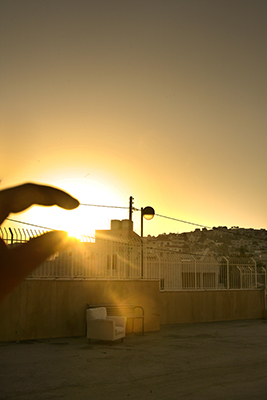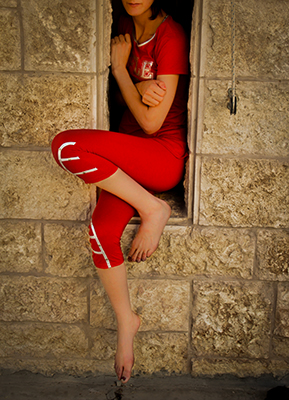The Path to Justice for Palestinian Women
Date:
“I called the number that the Ministry of Social Affairs gave me. Police came to our home and took me, and on the second day we went to court. The judge asked my husband if he beats me, and he said no. Then the judge told us to go and reconcile, saying it is a shame what we are doing, that we are grown up people. I went back to my husband, but I was afraid; he became worse. Then, the ministry sent me to the shelter. I filed a complaint against him, and he was in prison for three days. There was again a court session. The same thing happened as before, and again I went back with him. Now everything is worse than before.”*
Marwa, 36

However, three critical steps in the justice chain are starting to come together in Palestine, giving women who find themselves in Marwa’s situation a reason for renewed hope. First, the Palestinian Civil Police has established and trained 11 specialized Family and Juvenile Protection Units (FJPUs) in the West Bank to receive women victims of violence and file their cases; second, the Attorney General’s Office has just announced a landmark decision to formally establish a unit of 15 specialized public prosecutors (SPPs) to investigate and prosecute cases of violence against women, and third, the General Secretariat of the Council of Ministers is in the final stages of drafting a ground-breaking Family Protection Act that would for the first time provide women with important legal-protection measures against violence.
These three initiatives did not happen overnight. They are the result of years of hard work by a group of committed advocates within government institutions and activists from civil society. These advocates recognized not only that violence is a violation of a woman’s human rights, but also that the costs of violence are too huge for society to ignore: not only in terms of the direct financial allocations to the security, judiciary, and health sectors, but also in terms of indirect costs related to reduced productivity of both perpetrator and victim, and the impact of this on the GDP when aggregated.
Since 2008, the FJPUs have been headed by the top-ranking female police officer in Palestine, Colonel Wafa Muammar, and in the most recent 2015 perception survey of security and justice institutions, they attained the highest satisfaction score among beneficiaries (60 percent). A significant part of this trust is also due to the high number of female police staff in the FJPUs who put at ease the women beneficiaries who come to the police station to seek help. The staff of the FJPUs now play an important role in ensuring that women victims are listened to and their cases properly recorded so that they can move forward to the next step of the justice chain rather than being caught in what she describes as the usual procedure in times past:
“A woman comes to the police to lodge a complaint, but she will be the one blamed, even though she is the victim, and she will be sent back home to live what she did not want to live anymore.”
Colonel Wafa Muammar
The second of the three above-mentioned important events in strengthening the justice chain is the establishment in February 2016 of a specialized public prosecutor unit on violence against women. Although there have been informal agreements on specialization in the past, as long as the unit was not institutionalized within the structure of the Attorney General’s Office, its existence within the office was vulnerable to political and leadership change. Now, with the appointment of a Chief Specialized Public Prosecutor on violence against women, the access to justice before the courts should significantly improve. The SPPs have received substantial training, mentoring, and coaching to ensure that they have the skills related to investigation and legal characterization of sexual and gender-based violence crimes, including rape, sexual molestation, and incest. While the mentoring sessions expand the prosecutors’ litigation skills, they also discuss their own perceptions and attitudes towards issues of violence against women and girls (VAWG). In these sessions the SPPs learn from their peers’ experiences and also acknowledge their roles as agents of change from within the justice system.
“At first, we were not taken seriously, and many tried to say that these were merely women’s issues and therefore not important. I believe that those cases, on the contrary, are very sensitive and complicated, and a public prosecutor needs to be really strong and well-equipped with the relevant knowledge and skills to be able to deal with it.”
Suha Al-Shanti, specialized public prosecutor in Qalqilya

Palestine has made much progress over the last year and has much to celebrate on this year’s International Women’s Day. After all, Palestine has been blazing trails on this issue from the very beginning: it was the first country in the Arab region to establish a specialized multi-purpose center for the protection and empowerment of women and children victims of violence, the Mehwar Centre for the Protection and Empowerment of Women and Families”, in 2007. Palestine has had a strong and active civil society working for years to prevent and combat violence against women. And while significantly more work is required, there is a reason to hope with this new potential legislation on violence against women; with the institutionalized and specialized public prosecutors; and with the well-trained police in the Family and Justice Protection Units, including a sufficient number of female officers. Let us dedicate a moment of optimism on this year’s International Women’s Day to the hope that fewer women will experience Marwa’s despair and that instead more Palestinian women will find themselves firmly on the path to justice.
*UN Women, Access Denied: Palestinian women’s access to justice in the West Bank of the Palestinian occupied territories, 2014, p. 25
This article was originally published in the This Week in Palestine March 2016 issue.